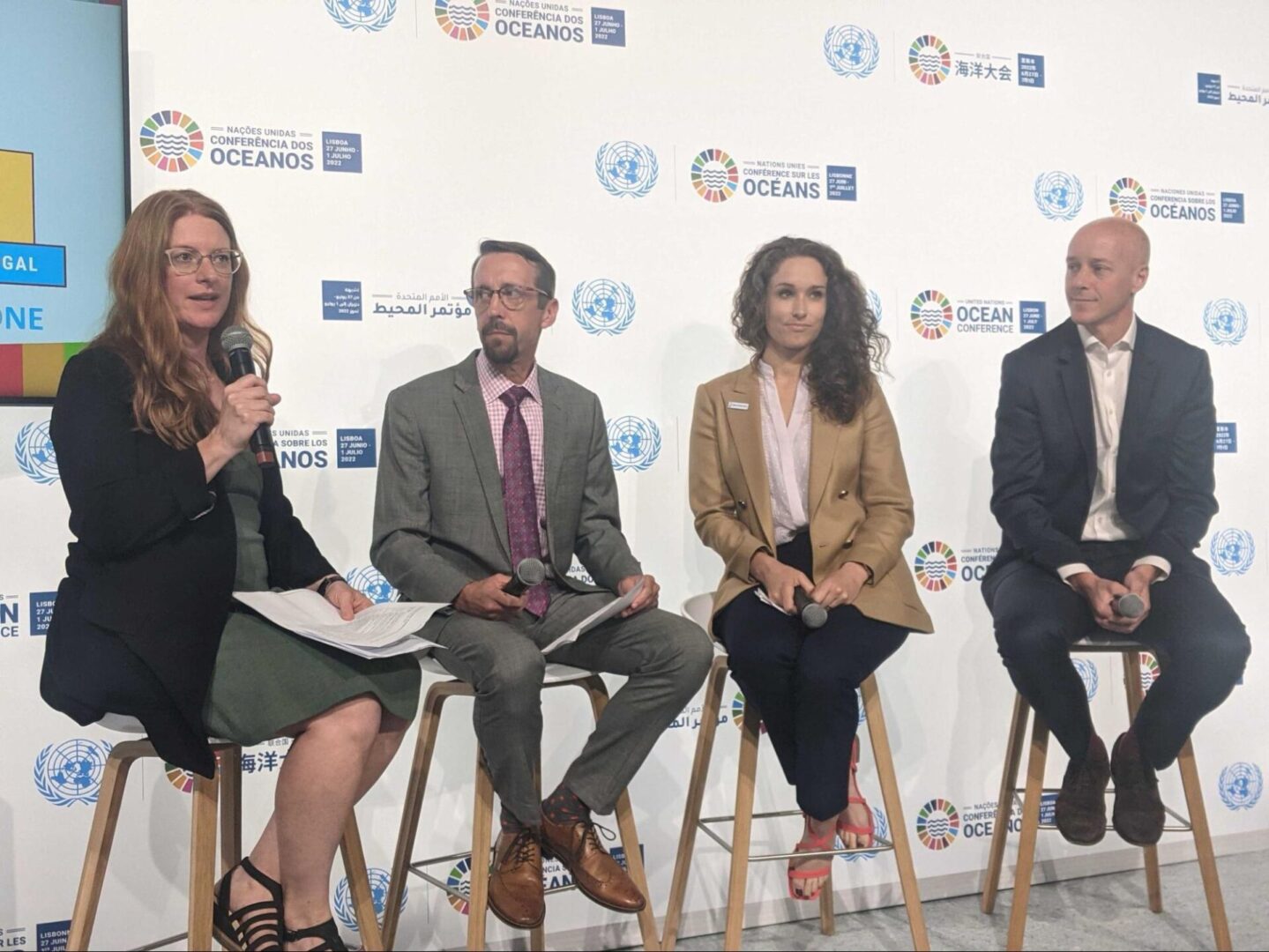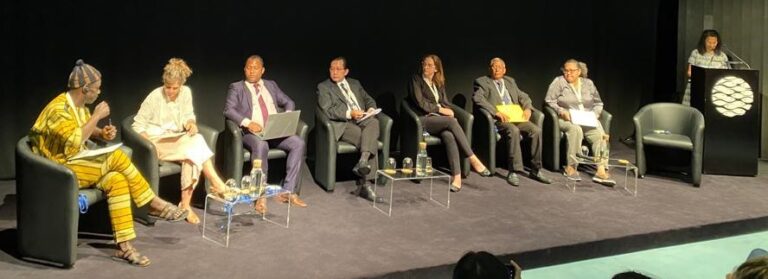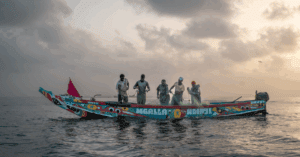The second United Nations Ocean Conference (UNOC) opened on June 27th amidst calls to recognise the role of small-scale fisheries in tackling what UN Secretary-General Antonio Guterres referred to as an ocean emergency. It closed a few days later with a declaration that largely ignores these calls and falls short of the ambition and courage needed to protect our blue planet.
The declaration, dubbed Our ocean, our future, our responsibility, neither adequately promotes the human rights of small-scale fishers, the primary users of the ocean, nor addresses the main drivers of biodiversity loss. It refers to ‘collaborative decision making processes that include all stakeholders, including small-scale and artisanal fisheries, but small-scale fishers have always been poorly represented in UNOC discussions, including those that formed the basis for the declaration.
This is why we supported small-scale fishers from across the globe to share their Call to Action, stories and experiences at UNOC, and to voice their concerns and needs around explicit recognition of their rights and their meaningful participation in decision-making. Leaders from coastal communities and civil society in Central and South America, Africa, Asia and the Pacific relayed messages and appeals to a wide range of audiences, including decision-makers and media, about their vital role in rebuilding coastal fisheries.
Small-scale fishers are the biggest group of ocean users, and science and practice have shown time and again that the most scalable, equitable and sustainable approach to conserving and restoring our oceans is to give them the rights and means to manage and rebuild the stocks on which they depend.
But as long as policymakers ignore their voices and fail to recognise their role in fighting hunger and protecting oceans, such efforts are doomed to failure. Through the myriad events, talks and interviews, the message the fishers delivered was a simple one: change is possible, but it starts not with talking for fishers, but in listening to what they have to say.
BV-supported UNOC Events:
A Small-Scale Fisher Call To Action
Small-scale fisher delegates launched a declaration calling for urgent action to protect and restore small-scale fisheries, and recognise their vital contributions to ocean economies, health and culture at a breakfast event we co-organised.
“I am convinced that small-scale fishers are the drivers of ocean health and sustainability, and that small-scale fishing is at the heart of everything,” said Gaoussou Gueye, president of CAOPA, a pan-African coalition of artisanal maritime and continental fisheries organisations.
Dialogues for marine conservation and artisanal small-scale fisheries
Small-scale fisher representatives spoke about their experiences of, and hopes and ideas for marine conservation, fisheries management and sustainable artisanal fishing at an event we co-organised with with CoopeSoliDar, a coalition representing organisations across Central and Latin America.
Exploring inshore exclusion zones at the Transform Bottom Trawling Coalition panel event
The Royal Thai Government announced a moratorium on new commercial fishing licences for bottom trawlers at a panel event we convened as a founding member of the Transform Bottom Trawling Coalition. Thailand’s commitment to addressing a pervasive and destructive form of industrial fishing that threatens coastal communities’ lives and livelihoods will also include a $US40 million decommissioning and buy-back scheme.
We celebrated the announcement and called on all states to decrease bottom trawling and embrace inshore exclusion zones free from industrial fisheries and preferential access areas for small-scale fisheries in a joint statement with EJF.
At the event, Alhafiz Atsari, representing the Indonesian Traditional Fisherfolks Union (KNTI), explained that in Indonesia:
“Small-scale fishers are forced to compete with industrial giants in our own waters. The giants are fishing vessels using destructive fishing gear, such as bottom trawlers. They take up so much space, are greedy and reckless, and can destroy everything in the ocean.”
Blue Ventures presentations
Our team spoke to a wide range of people across different platforms at UNOC, including addressing global decision-makers at the event and global audiences through media interviews. Our Executive Director, Dr Alasdair Harris, delivered a compelling speech to the UN plenary in a session opened by French President Emmanuel Macron, quoting several of the small-scale fishers whose calls and concerns he had heard at events we co-hosted.
“There is nothing small about small-scale fishers,” Harris said, “because they have the knowledge and global reach needed to reshape humanity’s relationship with our ocean.”
Harris stressed the importance of providing more space for fisher and community delegates and said that they ought to be the people being invited to speak at these sessions.
He also talked about the need for more community-led fisheries management and conservation models and fewer top-down approaches during a UN televised panel discussion hosted by Bloomberg Philanthropies in the UNOC Blue Zone.
Our Blue Carbon Technical Advisor, Leah Glass, took part in a Fair Carbon panel discussion hosted by Sea Shepherd and highlighted the importance of community involvement in blue carbon projects.
Links to full speeches, press pieces and more details about Blue Ventures’ week at UNOC:
The Canary – Thailand paves way for countries like the UK to limit disastrous bottom trawling
A UK-based news outlet The Canary covered our event on bottom trawling, and interviewed our Head of Advocacy Annie Tourette.
***
The Guardian – ‘Talk with us, not for us’: fishing communities accuse UN of ignoring their voices
The Guardian featured the voices and calls of fisher and civil society representatives we supported to attend and speak at UNOC.
***
Mongabay – U.N. Ocean Conference ends with promises. Is a sea change coming?
Mongabay feature with news announced at our TBT event from the Thai government about stopping issuing new licences to commercial industrial trawlers and decommissioning old vessels.
***
EcoBusiness – UN Ocean Conference leaves indigenous peoples feeling excluded (reprinted from Mongabay)
Mongabay’s piece was reprinted here, featuring civil society leader Vivienne Solis Rivera from a partner organisation in Costa Rica, CoopeSoliDar, and some of the artisanal fishers from across Central and Latin America that we supported to attend UNOC and speak at events.
***
Radio Catalunya – Sick oceans, dead fish and jobless fishermen
Fishers from around the world call on leaders and governments attending UNOC to end sea pollution and climate change, featuring small-scale fisher representatives we supported.
***
Loop – Small-scale fishers launch global call
Another feature on small-scale fishers and the launch of their global call to action.
***
‘El Debate’ – The ‘custodians of the sea’ claim ‘a seat at the table’
The world’s largest Spanish-speaking newswire EFE produced a TV piece featuring small-scale fishers on El Debate discussing the significance of attending UNOC and their wish to have their place in discussions and decision-making spaces where they are generally excluded, and their needs and calls sidelined or backbencher.
***
Swiss Info
A wide range of outlets ran a print piece based on EFE’s coverage, which included the voices of Spanish-speaking indigenous leaders from Chile.
***
France24 Espanol – Report from Lisbon: artisanal fishers demand to be heard
France24’s Spanish TV service featured small-scale fishers we supported from Mexico, Honduras, Panama, and Brazil.
***
UN TV – The Evolving Role of Philanthropy to Save Our Vibrant Ocean
Our Executive Director Alasdair Harris speaking on UN TV with Bloomberg Philanthropies and Global Fishing Watch. Scroll down to Wednesday 29 June – The Evolving Role of Philanthropy to Save Our Vibrant Ocean.
***
UN.org – Speakers Call for More Scientific Partnerships, Knowledge-Sharing to Protect Humanity’s Common Ocean Heritage, on Day Four of Lisbon Conference
Alasdair Harris’ speech to the UN plenary featured in the UN’s press highlights.
***
UN.org – 7th Plenary Session
Full video of BV Executive Director Alasdair Harris speaking here at 1hr47m in plenary session that President Macron of France opened.
***
Sea Shepherd – Fair Carbon Panel Discussion featuring Leah Glass
“There is so much to be learned by listening” says Leah Glass, Technical Advisor on Blue Carbon for Blue Ventures. “Encouraging conversations with state actors and communities is essential.”
***
Causa Natura – Faced with trawling, artisanal fishermen must be guaranteed access to marine resources: NGOs at Conference on the Oceans.
More coverage coming from our Transform Bottom Trawling event at UNOC.
***
Azul – They raised “the children with fishing” and want to decide the future of the oceans
A Portuguese magazine featured the voices of small-scale fishers who spoke at our first breakfast event.
More media pieces are to follow from a range of international media outlets featuring our Head of Advocacy Annie Tourette. These will be shared on the Blue Ventures website when they come out.
Watch the full Transform Bottom Trawling panel event: A Sea Change for Small-Scale Fisheries – Preferential Access and Inshore Exclusion Zones.




















